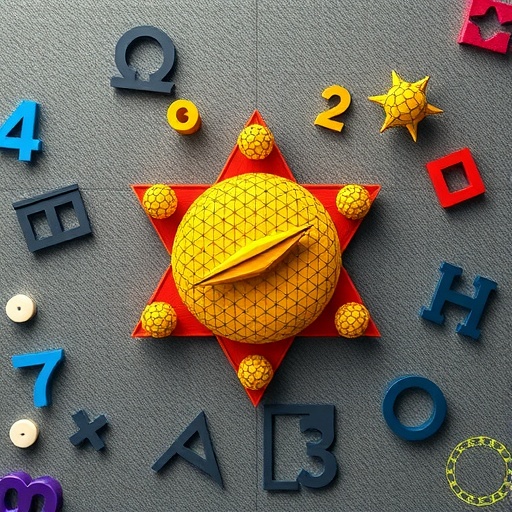In an era where mathematical literacy is paramount, educators continuously seek effective pedagogical strategies to enhance students’ critical thinking skills in mathematics. A groundbreaking study conducted by Syaiful, Mukminin, and Puspayanti explores the application of APOS theory in basic mathematics instruction. By focusing on this innovative theory, the researchers endeavor to cultivate a generation of mathematically proficient thinkers who can analyze and solve problems with confidence and creativity.
The research provides a framework for understanding how students assimilate mathematical concepts, linking abstract ideas with concrete experiences. This dichotomy is critical, as traditional teaching methodologies often neglect the significance of students’ cognitive processes when engaging with mathematical tasks. The APOS theory—standing for Action, Process, Object, and Schema—serves as a comprehensive model that guides learners through the different stages of understanding, enabling them to transform computational abilities into profound conceptual insights.
At its core, the study emphasizes the vital importance of critical thinking in mathematics, particularly in basic mathematics education. As global economies evolve, the demand for individuals with strong analytical skills grows correspondingly. By integrating APOS theory into mathematics curricula, the researchers anticipate a notable improvement in students’ capabilities to dissect mathematical information, assess various problem-solving strategies, and draw logical conclusions. This paradigm shift encourages a more active learning environment where students are not merely recipients of information but active participants in constructing their knowledge base.
The practical implications of this research resonate deeply with educators and administrators alike. By implementing the strategies based on APOS theory, teachers can create a dynamic classroom atmosphere that fosters inquiry, dialogue, and exploration. This method shifts away from rote memorization towards a more engaging and meaningful mathematical experience. In essence, on a micro level, classrooms transform into laboratories of thought, where inquiry reigns supreme, and students are prompted to question, hypothesize, and solve.
Additionally, the researchers conducted extensive empirical investigations to validate their findings. The data gathered from participating students demonstrated a significant correlation between the use of APOS theory and the enhancement of critical thinking skills in mathematics. These results challenge conventional instructional paradigms and urge educators to reconsider their strategies for imparting mathematical knowledge. The integration of APOS theory into basic mathematics not only aligns with educational standards but also addresses the deeper cognitive mechanisms that facilitate learning.
Moreover, the study underscores the relevance of fostering emotional intelligence within the mathematical learning process. Educators are encouraged to recognize and support the emotional aspects of learning mathematics—namely, the anxiety and resistance often associated with the subject. By addressing these emotional barriers, teachers can facilitate a more positive learning experience that motivates students to engage with mathematics actively. This holistic approach merges cognitive and emotional dimensions, thereby enriching the educational landscape.
The implementation of APOS theory extends beyond mere theoretical implications; it has profound real-world applications. Students empowered with strong critical thinking skills can tackle complex scenarios encountered in their daily lives and in their future careers. This endeavor not only shapes adept mathematicians but also cultivates responsible citizens who can navigate societal challenges with analytical prowess. In a world increasingly driven by data and unpredictable variables, the ability to think critically and make informed decisions is a priceless asset.
As educators embrace the findings of Syaiful, Mukminin, and Puspayanti, discussions surrounding the new methodologies highlight the necessity of professional development. Teacher training programs must adapt to furnish educators with a deep understanding of APOS theory, enabling them to implement these pedagogical strategies effectively. Continuous training will empower teachers to identify students’ needs and adapt their approaches, thereby tailoring education to maximize each student’s potential.
Furthermore, the critical examination of educational outcomes based on the implementation of APOS theory opens avenues for future research. Investigators can delve deeper into the varied dimensions of mathematical reasoning and critical thinking, fostering an academic environment conducive to ongoing discovery and improvement. Collaborative efforts among educators, researchers, and policymakers can yield frameworks that ensure robust mathematical education for all students.
In the shifting landscape of education, the commitment to rigorous and thoughtful instructional strategies must remain steadfast. As the research unfolds, the ripple effects of using APOS theory in basic mathematics instruction will likely inspire a broader reformation of teaching practices across various subjects, fostering inquisitive and skilled thinkers prepared for a multifaceted world.
Ultimately, the interplay between APOS theory and mathematics education highlights the transformative power of innovative teaching strategies in shaping the future of education. By positioning critical thinking at the forefront, educators can fuel a movement that prioritizes comprehension over memorization, thus preparing students for the complexities of a rapidly changing society. As these teaching methods continue to gain traction, we can anticipate a generational shift in how students understand and engage with mathematics—one that values inquiry, creativity, and robust analytical capabilities.
In summary, the intersection of APOS theory and basic mathematics education lays a formidable groundwork for cultivating critical thinking skills among students. The research conducted by Syaiful, Mukminin, and Puspayanti not only advocates for a reflective approach to teaching but also invites educators to be proactive agents of change, committed to fostering a mathematically literate society equipped for future challenges.
Subject of Research: The application of APOS theory in basic mathematics to enhance students’ mathematical critical thinking skills.
Article Title: Using APOS theory in learning basic mathematics to promote students’ mathematical critical thinking skills.
Article References:
Syaiful, S., Mukminin, A. & Puspayanti, P. Using APOS theory in learning basic mathematics to promote students’ mathematical critical thinking skills.
Discov Educ 4, 443 (2025). https://doi.org/10.1007/s44217-025-00863-2
Image Credits: AI Generated
DOI: 10.1007/s44217-025-00863-2
Keywords: APOS theory, critical thinking, mathematics education, pedagogy, cognitive development.




